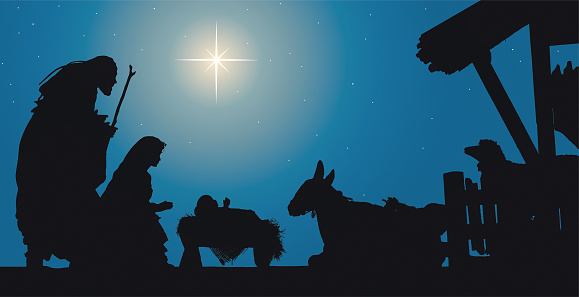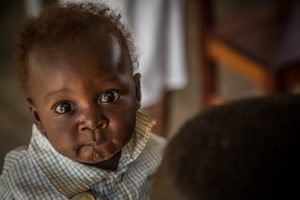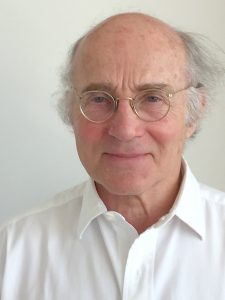“We Must Choose, We Must Act”

Today we are reposting board member, Desmond FitzGerald’s thought-provoking reflection about the story of Jesus’ birth and his reminder that “we must choose, we must act.” We were so moved by his piece that it was used as the inspiration of this year’s CMMB Christmas card this year,
Originally published December 16th 2016
As we struggle to keep our perspective and our sanity in the commercial tsunami of the Christmas season, we must find quiet opportunities to contemplate the story of Jesus’ birth in all its powerful simplicity. It is so energizing, so full of hope, to understand that the most important person in human history was born in a stable, surrounded by farm animals, to an indescribably poor, illiterate, unmarried Palestinian peasant girl. This is really astonishing.
How extraordinary that this little boy should grow up from such profoundly unpromising circumstances, to change the world. And what an encouraging example Jesus’ story offers each of us: we can overcome our limitations, we can be truly helpful and live productive meaningful lives. It is a great gift to have the opportunity to respond to the call.
Christmas is not only a celebration of Jesus’ birth but also a season celebrating generosity – perhaps sparked by the gifts of the Magi. “Generosity” is obviously a very complex idea. It may begin with the simple realization that someone needs something more than we do. This insight – the Buddhists would call it “mindfulness ” – may come upon us gently – or suddenly – and in some instances, may be tinged by guilt. Why have we been so lucky, and others have not? Why was I born, by grace, into a solid family in America – and not in a Soviet gulag, or a brothel in Calcutta, or a refugee camp?
After realization comes the question of response. What are we going to do about it? How are we going to respond to the huge needs all around us – or, more precisely, to some needs, somewhere, since we obviously can’t respond to all the needs, everywhere. It is so easy to be immediately overwhelmed – paralyzed into inaction by the immensity of the problems. Where can we begin? What difference can we make? Is it all just hopeless? Would anything we could do be useful? meaningful?
This is the hardest part: where and how to begin. In these moments of weakness, of paralysis, we can draw strength from a profound epigram from the Babylonian Talmud: “He who saves one life saves the whole world.” This short phrase, in all its complexity, offers us much to contemplate. On its surface, it is factually incorrect: saving one life does not save the whole world. But at a much deeper level, it resonates very powerfully, unforgettably.
And so, generosity must begin with realization, followed by effective action. Each of us will be moved – touched – by different experiences, different problems, but we must begin somewhere, we must choose, we must act. In the words of John Wesley, “Do all the good you can. By all the means you can. In all the ways you can. In all the places you can. At all the times you can. To all the people you can. As long as ever you can.”
“You have never really lived until you have done something for someone who can never repay you.” Mother Teresa
One story energized me a dozen years ago and pushed me into action. I read in the New York Times about an Indian immigrant taxi driver here in New York who inherited his parents’ little house back in India upon their deaths. He looked into selling it, but soon found out that it was worth so little that the prospective proceeds wouldn’t particularly move the needle even in his modest circumstances. So he thought long and hard about how to optimize the meaning and value of this inheritance and decided to establish a school for girls there. Girls were not traditionally considered worth educating in that region, and he set about changing that dysfunctional culture.
He hired a teacher and soon 50 girls were studying there, profoundly changing not only their own lives but their families’ and future children’s. The house where the school now flourishes has a mango grove out back, and together with the modest income from the sale of the fruit, the taxi driver was able to underwrite the cost of the school for $2,500 a year! (That’s not a typo!) I found this story irresistible and energizing! Time to get off my behind, I immediately realized. If this guy can do all that he’s doing, what am I waiting for? That’s when I established the Hope for Poor Children Foundation, to help poor children and their families with basic health and education. This little foundation is honored to support the life-saving and life-changing work of CMMB.

Baby in South Sudan. What does his future hold?
As we think about that young girl and her baby boy in Palestine over 2000 years ago, we realize how many people in similar circumstance today are struggling to survive, hoping that some day their child might reach some of their potential, that they will have the opportunity to grow and flourish.
All Christmas gifts will be doubled!
Unique gifts that can make a real change
Author: Desmond FitzGerald serves as a trustee on CMMB’s Board.
